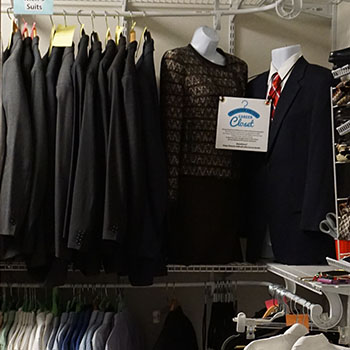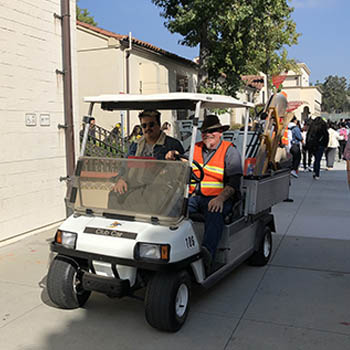Tyler Deacy
Director of Sustainability
(714) 992-7054
Room 1318-04, Bldg. 1300
Hours: M-F 8 am – 5 pm (Hybrid)
Saturday-Sunday Closed
tdeacy@fullcoll.edu
Fullerton College believes that in order to accomplish its goal of nurturing the future generation of leaders, we need to make sure they have a healthy planet in which to lead. So the college does everything it can to be good stewards of the environment. You can learn about the college’s efforts on this site.
Sustainability Efforts

Courses
Fullerton College offers courses that incorporate sustainability, such as Global Environmental Problems, Climate Science and Environmental Biology.

Student Life
A number of student organizations and organized activities dedicated to environmental stewardship call Fullerton College home. These include the Students for Environmental Sustainability Club, the annual Earth Day Symposium and attendance at the CA Higher Ed Sustainability Conference.

Governance
Two bodies in the college’s shared governance system are dedicated to promoting sustainability. They are the Sustainability Committee and the Associated Student Committee on Environmental Sustainability.

Innovations
The college is constantly looking for new, innovative ways to be more sustainable. Some of these innovations include the Buzzy Bites program.
Building Design & Construction
Building construction and renovation is executed with sustainability in mind at Fullerton College. The district’s design standards for new building construction must exceed Title 24 energy standards by 15 percent and 10 percent for modernization of existing buildings. New construction and major renovations and modernization participate in the utility provider’s Savings by Design incentive program.
Energy Consumption
Fullerton College retrofitted or replaced over 6,427 bulbs and fixtures with LED lights. Proposition 39 projects have resulted in an estimated reduction of over one million kWh of energy use annually.
Waste Minimization and Diversion
Fullerton College minimizes waste or diverts it from the landfills at every opportunity. In 2019, it diverted:
- 29.9 tons of paper and cardboard
- 4.4 tons of electronic waste
- 400,000 single use plastic bottles saved with water bottle filling stations
Water Use
Over 36,000 square feet of traditional landscaping has been replaced with drought tolerant plants, along with a new drip irrigation system to reduce the amount of water used.

Janitorial Purchasing
Fullerton College used a premixing and dispensing system to prepare its cleaning chemicals which eliminates mixing chemicals by hand, reducing the amount of chemicals used due to improper dilution ratios. With the exception of the disinfectant, all chemicals either have the UL Eco Logo, which certify the product has a reduced environmental impact, or they have the Green Seal which certifies the product has tangible reductions in the whole environmental footprint.

Campus Vehicles
Fullerton College staff members use light-duty electric carts for maintenance vehicles on the grounds and the HVAC shops.

Governance
Two bodies in the college’s shared governance system are dedicated to promoting sustainability. They are the Sustainability Committee and the Associated Student Committee on Environmental Sustainability.
STARS
The Sustainability Tracking, Assessment & Rating System (STARS) is a transparent, self-reporting framework for colleges and universities to measure their sustainability performance. STARS measures a college’s performance by the factors below.
Academics
- Academic courses
- Learning outcomes
- Undergraduate program (degrees & certificates)
- Immersive experience
- Sustainability literacy assessment
- Incentives for developing courses
- Campus as a living laboratory
- Research & scholarship
- Support for sustainability research
- Open access to research
Engagement
- Student educators program
- Student orientation
- Student life
- Outreach materials and publications
- Outreach campaign
- Assessing sustainability culture
- Employee educators program
- Employee orientation
- Staff professional development and training
- Community partnerships
- Inter-campus collaboration
- Continuing education
- Community service
- Participation in public policy
Operations
- Emissions inventory & disclosure
- Greenhouse gas emissions
- Building design & construction
- Building operations & maintenance
- Building Energy consumption
- Clean & renewable energy
- Food & beverage purchasing
- Sustainable dining
- Landscape management
- Biodiversity
- Sustainable procurement
- Electronics purchasing
- Cleaning & janitorial purchasing
- Office paper purchasing
- Campus fleet
- Commute modal split
- Support for sustainable transportation
- Waste minimization & diversion
- Construction & demolition waste diversion
- Hazardous waste management
- Water use
- Rainwater management
Planning & Administration
- Sustainability coordination
- Sustainability planning
- Inclusive & participatory governance
- Reporting assurance
- Diversity & equity coordination
- Assessing diversity & equity
- Support for underrepresented groups
- Affordability & access
- Committee on investor responsibility
- Sustainable investment
- Investment disclosure
- Employee compensation
- Assessing employee satisfaction
- Workplace health & safety






